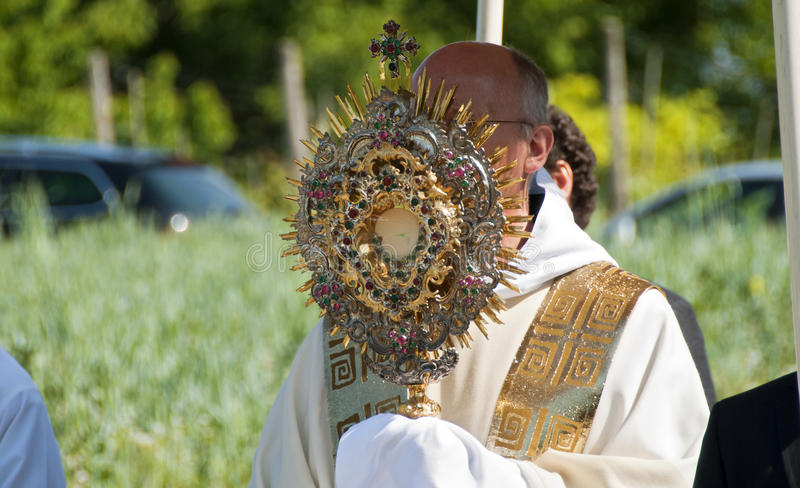
Christ present in the Monstrance, and within ourselves – as Tabernacles of the Lord
Aidan Hart calls for more attention to church teaching on the Eucharist as both food for the journey and the assurance of God’s presence within us as Tabernacles of the Lord.
One of the issues that has struck me powerfully during the current lockdown of Catholic churches is the talk by many members of the laity, and priests speaking on their behalf, about missing going to daily Mass and Exposition of the Blessed Sacrament or visiting their local church to pray. I recently heard of one priest in south Down exposing the Blessed Sacrament in a monstrance placed in his front downstairs window so that parishioners could drive or walk in and pray in front of the Blessed Sacrament!
The question has to be asked – What is the purpose of Sunday Mass? Or to put another way – What is the primary purpose of Eucharist?
Is it ‘to put one into the presence of God’ and then to perpetuate that divine Presence in Exposition of the Blessed Sacrament, or is it ‘to be fed and healed by God’. The current theological custom of Eucharistic Adoration, although well-intentioned, is nevertheless bad theology in wrongly over emphasising the first principle of divine Presence in Eucharist while Sacred Scripture emphasises the second – Eucharist as divine feeding.
This is not to deny the substantial, sacramental and real presence of Jesus the Christ in Eucharist but rather to explore its primary purpose. At the Last Supper, which was a ritual meal during which Eucharist was instituted, Jesus asked His disciples to “take and eat; this is my body;…..drink…this is my blood” (Matthew 26). He did not say ‘take this and adore’, although the adoration of God was central to the Jewish faith. Therefore, Jesus offered Himself to His apostles and future followers as divine food.
What is the purpose of food? It is to give us health, strength and growth. In Eucharist Jesus offers us Himself as divine food to keep us spiritually healthy, to strengthen us in our faith and love of God and to help us grow in our ongoing awareness of His divine, perpetual Presence within us from the moment of our conception.
Eucharist feeds us to remain faithful to that interior, divine Presence by the way we live our lives, interact with others and help spread the Kingdom of God’s unconditional love on that small part of the earth which we inhabit. Eucharist heals us of our sins and moral weaknesses; after we have confessed our sinfulness at the beginning of Mass and called upon God’s mercy, the priest, in the power of God, absolves us of our sins in the prayer “ May almighty God have mercy on us, forgive us our sins, and bring us to everlasting life.
Both Old and New Testaments have many references to God assuring us that He is always present within us and around us; to give just one from the Hebrew Testament; Joshua 1:9; “the Lord your God is with you wherever you go.” And one from the Christian Testament; Mat.28:20 “I am with you always, to the end of the age. That divine presence within us makes each and every one of us the tabernacle of God on earth. (cf. Revelation 21:3)
The Second Vatican Council in 1962, in Sacrosanctum Concilium 7 and 8 stressed five divine Presences; Jesus present in all seven sacraments, in Eucharist, in the celebrating priest, in all members of the congregation and in the bible readings.
“To accomplish so great a work, Christ is always present in His Church, especially in her liturgical celebrations. He is present in the sacrifice of the Mass, not only in the person of His minister, “the same now offering, through the ministry of priests, who formerly offered himself on the cross”, but especially under the Eucharistic species. By His power He is present in the sacraments, so that when a man baptises it is really Christ Himself who baptizes. He is present in His word, since it is He Himself who speaks when the holy scriptures are read in the Church. He is present, lastly, when the Church prays and sings, for He promised:
“Where two or three are gathered together in my name, there am I in the midst of them” (Matt. 18:20).” (Sacrosanctum Concilium)
To pray in the presence of God we only have to pray while being aware that God is intimately present within us and all around us at all times. We only have to open our bible and meditatively read a passage, in the awareness that through this biblical word God is truly speaking to us and thus present to us. Our homes are the tabernacles of God, especially (but not only) when they are used for family or individual prayer or the prayerful reading and reflection on Sacred Scripture. How often have we heard that preached about?
Throughout the day it builds us up spiritually if, for a few seconds as we drive along, are out walking or are in our own home or office, we acknowledge that presence by mentally and prayerfully saying, for example;
”My triune God present within me and all around me, I praise You, I worship You and I adore You. I love You with all my heart and soul, and with all my mind and strength.”
